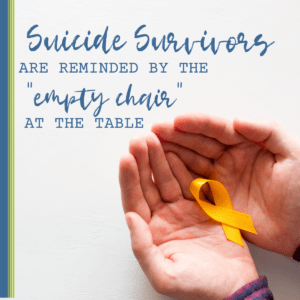The holidays tend to be a difficult time for those who have lost a loved one. This is especially true for family and friends who have died by suicide. Within the last year, I have been able to come alongside friends and family who have lost loved ones by suicide. As we celebrate the holiday season, suicide survivors are reminded of the “empty chair” at the table. The Saturday before Thanksgiving has been designated as International Survivors of Suicide Loss Day. It is a day where family and friends of those who have died by suicide can come together for support and healing.
Now, more than ever it is important to support those who are grieving and take care of ourselves as we grieve. In addition to the ambiguous grief with uncertainties and loss, there is also the aspect of traumatic grief in death by suicide. Considering the mental health crisis we are in, many suicide survivors are currently struggling with their own mental health struggles such as major depression in complicated grief or otherwise known as complex bereavement. The bereavement process also can be more complex due to the traumatic nature of suicide.
Families are trying to make sense of and process their loss. Why would a parent kill themselves, leaving behind their partner and children? How could someone who appeared to be outwardly successful be gone the next day? It is estimated that for each person who dies by suicide, they leave behind at least six “suicide survivors.
Learning that a close friend or family member died by suicide is a traumatic event that can be incredibly painful to talk about. Witnessing a loved one’s attempt or the aftermath leaves one in a state of emotions such as fear, helplessness, and horror. These feelings can be frequently triggered depending on the circumstances of death. Survivors may have to recount disturbing details of events. These may be experienced as recurrent, involuntary, and distressing images that relive the trauma. Survivors may find themselves replaying details from earlier events, trying to understand and make sense of their loved one’s final moments. They may blame themselves and suffer from distress in response to cues that are reminders of the loss. Survivors may begin to retreat and avoid thoughts, memories, feelings, or talking about the suicide.
The circumstances that were surrounding a loved one’s suicide can also be difficult to address due to the stigma around mental health and a sense of shame in talking about events such as suicide. How does one talk about suicide within their community? How do you talk to children who have lost a parent? Can you talk about suicide in your religious/ faith communities? How do you respect the privacy of families who may not feel comfortable talking about suicide loss?
The Suicide Prevention Lifeline offers some great tips
How to Support Others Who Lost a Loved One to Suicide:
- Accept Their Feelings
- Listen and validate feelings, no matter what or how intense they are
- Just be present to listen.
- Use Sensitivity During Holidays and Anniversaries
- These events may be especially triggering. Be there to support friends/ family during this difficult time.
- Choose your words wisely.
- Be attentive to what the suicide survivor and/ or their family needs.
- Offer your physical and/ or emotional support to help out in practical ways where you can.
- Use the Loved One’s Name
- There is great power in using the name of the person who died when talking about them as they are not forgotten.
- Share memories and stories about the loved one.
How to Support Yourself After Loss by Suicide:
- Find a Support Group
http://www.suicide.org/support-groups/minnesota-suicide-support-groups.html
https://afsp.org/find-a-support-group/ - Do What Feels Right to You
- Everyone grieves differently; there is no “right” way to grieve.
- If talking or meeting in person does not feel comfortable at the moment, that is OK–there is no need to rush the process.
- Write. This can be a great outlet when talking is too difficult. Letter-writing is also a safe outlet to express words to the deceased.
- Ask for Help
- Lean on family and friends for support.
- Reach out to your local faith/ religious or other local community support.
- Look for a therapist that is skilled in working with grief/ loss, particularly loss after suicide. CARE Counseling has a great team of clinicians who are skilled in these areas.
Books:
Life After Suicide: Finding Courage, Comfort, & Community After Unthinkable Loss by Jennifer Ashton
No Time to Say Goodbye: Surviving The Suicide of a Loved One by Carla Fine
We’re Here to help
Our wellness experts will be happy to take care of you. You can CLICK HERE to schedule an appointment now or call (612)223-8898.
Meet Clinicians
We’re united by our commitment to providing effective, relevant, and innovative mental health support at all stages of your journey. Click Here to find out more about who we are, where we come from, and how we live out CARE’s mission every day.
The professionals at CARE are actively collecting and creating resources to help with what you need. We’re Here for You.




